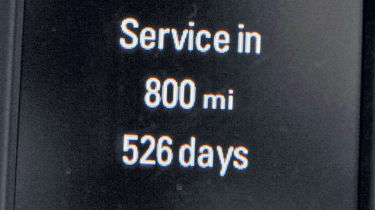Car service intervals explained: how often should you service your car?
Whether your car is petrol, diesel, hybrid or electric powered, it’s going to need a service. Here’s a quick guide to car servicing and service intervals…
Every carmaker will tell you that sticking to your vehicles’ maintenance schedule is the best way to keep it running smoothly and protect its residual value. You may be wondering exactly when your car needs to be serviced, what that service includes and how much it will cost. We’ve put together this guide to explain everything you need to know about service intervals.
Most manufacturers recommend that your vehicle is serviced once a year or every 12,000 miles, whichever comes first. There are lots of variations on this schedule depending on the car so it’s vital that you check the vehicle handbook to find out what its service intervals are. Some cars also have variable service intervals, warning the driver that a visit to the dealer is due based on data collected from sensors around the vehicle.
If you buy a new or near-new car, your dealership may offer you an annual vehicle service plan as part of the deal. This will cover all servicing costs within a particular time frame and make your car running costs that bit more predictable.
How often should you service your car?
If your car is still within the manufacturer's warranty, you’ll need to have the car serviced in line with the manufacturer's service schedule to keep the warranty valid. Older cars can also benefit from annual servicing - a regularly serviced and properly maintained car should drive for decades and reach hundreds of thousands of miles on the odometer with few problems. By servicing your car properly and keeping a detailed service history, you help preserve its value when the time comes to sell.
What is a car service?
During a car service, a mechanic will inspect your vehicle’s brakes, oil, filters, and other mechanical and electronic systems to make sure everything is in safe, working condition.
You’ll need to pay an upfront fee for a vehicle service and you may have oil and filter changes included in this price. The mechanic will carry out a thorough inspection of your vehicle and may then suggest part replacements depending on the condition of the vehicle. The cost of these replacements is usually not included in the price of the service, and you will have to pay extra to have any issues fixed.
What’s the difference between an MOT and a service?
An MOT is an annual test that your vehicle must pass to drive on British roads legally. The MOT ensures that all vehicles on the road are safe and roadworthy, and you won’t be able to drive your car if its MOT has expired or your vehicle has failed its MOT.
A vehicle service is a deeper, more thorough vehicle inspection than an MOT. Vehicle services are designed to identify any issues a car may have before any repairs or part replacements are carried out. A car service is not a legal requirement, but car manufacturers recommend you have your vehicle serviced on a routine basis to keep it running smoothly for as long as possible.
How much does a car service cost?
The pricing of a car service depends on the condition of the vehicle, the repairs you need to have done and the cost of the mechanic’s labour. As a rough guide, an average family hatchback could cost between £90 and £200 before any repairs. Luxury and sports cars tend to have pricier servicing costs as a result of more expensive components and can range from £500 to £1000 and beyond.
Manufacturers produce an itemised list of the jobs that need doing at each service on a car’s service schedule and so some services can be more expensive than others.
Even though older cars are more prone to getting problems, it is equally as important to get newer cars serviced. Your manufacturer or leasing agency may require you to have your car serviced annually during the term of your deal in order to maintain its condition and protect its value.
Do you need to service an electric or hybrid car?
Electric and hybrid vehicles need to be serviced just as a combustion-engined vehicle would. Although many of the components are different, it’s still equally as important to have your vehicle’s steering, suspension, brakes and powertrain inspected and maintained. Electric and hybrid vehicles typically require the same annual service to remain within the manufacturer warranty but servicing costs are usually lower than an equivalent petrol or diesel car.
Check out our guide on car maintenance jobs you can do yourself
Find a car with the experts









